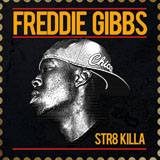
Freddie Gibbs
Str8 Killa EP
(Decon Records/Gibbs Family; 2010)
By Colin McGowan | 6 August 2010
Phonte Coleman of Little Brother (sorta) fame once made the facile plea “Dope beats, dope rhymes / What more do y’all want?” The crucial flaw in his argument was that this statement was uttered on the slumber-inducing Minstrel Show (2005), which invoked sarcastic responses of “for you to shut up.” Ironically, the artist to prove Tigalo’s jejune thesis is Freddie Gibbs, who one imagines would sooner throw the Carolina native in his trunk than shake his hand. Because, you see, Freddie Gibbs has no patience for whining. His is a world of black and white, heat and tedium, Gibbs and Not Gibbs. Fortunately, Str8 Killa explores only the black, heat, and Gibbs portion of the universe, without offering any credence to bullshit.
I’m sure there’s a narrative to be woven from the fabric of Gibbs’ burgeoning career, something about being Pac’s spiritual successor or his role as the mouthpiece for one of America’s most economically depressed cities while America as a whole suffers. But those angles feel forced because a) Gibbs is a better rapper than 2Pac ever dreamed of being, and b) his music isn’t quite that high-minded. My second observation isn’t a slight; Gary’s native son has the sort of tunnel vision that bores holes through everything in its path. Ostensibly, Freddie Gibbs is straightforward and cocksure; he’s very good at what he does. During his set at Pitchfork, he revealed that his vocabulary when discussing his music is short and sharp. “Murder,” “skimask,” and “gangsta,” all appended with the word “shit,” are the terms in which Gibbs characterizes his oeuvre. Str8 Killa is all of those things. It is also breathtaking in its execution. Discussing skill in its purest distillation is redundant, so here’s this: Gibbs’ flow is gruff, nimble, commanding, liquid, adamant, infectious. His first words, first sentence, and first paragraph were delivered at the age of ten months in a breathless double-time flow while holding back an inhale. The malice with which he slays mics is downright intrinsic.
Gibbs is also the beneficiary of some of best production of the year. The sound prevalent on Str8 Killa resembles a marriage of the styles present on the two mixtapes Gibbs released last summer (Midwestgangstaboxframecadillacmuzik and The Miseducation of Freddie Gibbs). The brooding tones of Midwestgangsta are often present here, but they’re not nearly as muddy and unadventurous, now adorned with the slick engineering and nuance of the production on Miseducation. On opener “Str8 Killa No Filla,” the Block Beataz construct a beat around some menacing blips and handclaps, but, as is their wont, they embellish the track with thunderous bass and descending synth lines that kick in every few bars. Plus, as Clay has observed, they do that thing where they fuck with the rappers’ voices a lot, and the result is a sonorous slab of street shit that sounds marvelous. For the most part, the other producers—DJ Burn One, Kno, LA Riot Kids, et al.—follow suit, creating a unified block of piff that makes me want to buy a hooptie, throw a $500 system in it, and drive around the greater Chicago area blasting this for the next calendar year.
Another element that makes Str8 Killa one of the most compelling rap records of the year is something Gibbs hasn’t fully realized. Archetypes, fun as they can be, fizzle out like cheap fireworks. Within Freddie Gibbs’ gut teems a dense glut of humanity. There is a vulnerability pulsing within “National Anthem (Fuck the World)”—particularly the way he belts out that hook—that hints at an as-of-yet unseen depth of emotion. Sure, there’s the angsty confusion contained in “Live by the Game” and “Rock Bottom,” but the remainder of the record is an alternately gleeful and angry “fuck you.” What implicitly seems to drive Gibbs is a sometimes unhealthy chip that resides on his shoulder. As self-assured as his boasts can get, there’s a chorus of nagging doubts beneath his swagger that humanizes him. Intermittently, his sneering visage cracks, dissolving into weariness. The weariness here is pretty simplistic—“Rock Bottom” leans on substance abuse and the laments on “Live by the Game” are mere “trapped in the trap” tropes—but like all words that pour out of the Gary native’s mouth in technically dazzling flows, they carry a weight of authenticity reminiscent of a gangsta rap elder statesman like Scarface. Because the same anvil-like heaviness that pervades Gibbs’ skimask tracks translates to his laments; he portrays affliction as masterfully as furious swagger.
The future might see Gibbs further erase the delineation between those two themes, between Gangsta Gibbs and Freddie. But Lord knows if he does, it won’t be some circus like T.I. vs. T.I.P. (2007). He would never entertain that sort of gimmickry—if there is a conceit that runs through Gibbs’ music, it’s his unwillingness to compromise. One imagines he was dropped from Interscope not just because they couldn’t figure out how to market him, but because he wouldn’t record anything for teenage girls or the ringtone market. Or he blew weed smoke in Iovine’s face and told him to go fuck himself. I mean, I’ve seen the guy tell his P.O. to go fuck herself in the middle of idle stage banter. This is because Gibbs is an arrogant prick, but also because he’s a nihilist who hates authority and values his autonomy over everything. This is (bear with me) a good thing; some of Gibbs most irksome qualities as a person are what make him an important artist. Now that he’s out from under Interscope’s specter he is afforded that autonomy, and, as he’s proven with his last handful of releases, he uses the lack of interference to record his favorite brand of gangsta shit. If the music wasn’t great we wouldn’t care, but it is and we should. Mission statements matter when the result’s got a hop like this.





